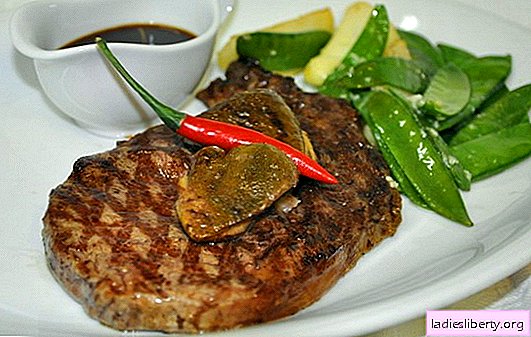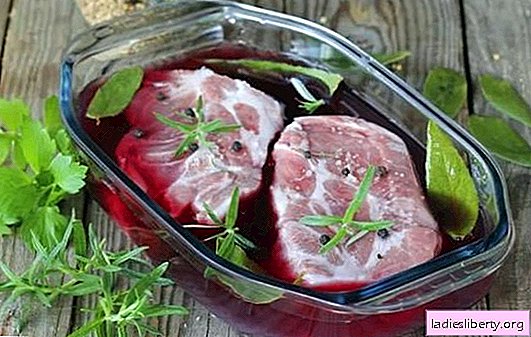
According to the WHO definition, the group of the elderly includes people aged 60 to 75 years.
By this period of life, activity, calorie demand decrease, metabolism is disturbed. This is due to a low hormonal background by this age, secretory function of the stomach, intestinal motility. All these changes in the body lead to a violation of the absorption of vitamins and many nutrients.
The need for vitamins for the elderly
Vitamins for the elderly play an important role, since a deficiency of any of them can become a trigger for a significant deterioration in the general condition and progression of existing diseases. 4 out of 5 elderly people have hypovitaminosis.
Some features of the lifestyle and opportunities of older people lead to a shortage of fruits and vegetables in the autumn - winter period. The menu consists of a large number of refined products and therefore creates a large deficiency in vitamins and coarse fibers. A large number of drugs used at this age for various reasons, as well as medically induced diets, exacerbate hypovitaminosis. The main amount of vitamins a person receives with food. Some of them - A, D, E, B12 - are synthesized by the body itself in small quantities.
What vitamins are needed primarily for the elderly
Given all the changes that occur in the body by the age of 60 years, it becomes clear what vitamins are needed primarily for the elderly. These are antioxidants that prevent aging, prevent cancer, keep blood vessels and heart, eyesight and intestinal mucosa in a normal state. These include vitamins A, C, E.
C is a water-soluble vitamin found in vegetables, many fruits and herbs. A and E are fat-soluble, their source is butter, milk, eggs.
What vitamins are necessary primarily for the elderly, it turns out during a detailed examination, when over time the condition gradually worsens, general symptoms (unmotivated weakness, lethargy, sleep disturbance, irritability, decreased appetite) increase, but these manifestations do not fit into the clinical picture of any disease .
Vitamin C - A Leader Among Antioxidants in the Elderly
The first place among antioxidants is ascorbic acid - vitamin C, which affects the state of blood vessels and the heart:
• reduces the permeability of the vascular wall;
• strengthens the heart muscle;
• indirectly reduces cholesterol and thereby prevents the formation of blood clots.
Contained in sea buckthorn, citrus fruits, wild rose, tomatoes, red pepper. The daily rate should not be less than 60 mg.
Vitamins for the Elderly - Deficiency A
Vitamin for the eyes - A (retinol). Supports vision: prevents the cornea from drying out, helps maintain clarity of image and color perception.
It is responsible for the activation of tissue respiration and the regulation of fat metabolism.
This is a vitamin of youth and beauty - strengthens nails, hair.
Its deficiency leads to increased fatigue, frequent colds, fragility and hair loss, their delamination. Contained in carrots, herbs, spinach, green peas, pumpkin, eggs. The daily norm is 800 mcg. It is acquired in the presence of fats.
Tocopherol - Vitamin E for the Elderly
Among the vitamins for the elderly, another antioxidant is of paramount importance - vitamin E (tocopherol), which can infect with energy and stamina.
Very important for people over 60 years old. It inhibits aging, protects the brain from damage.
It reduces the likelihood of blood clots, helps to strengthen muscles, increase stamina.
Prevents and inhibits the development of cataracts and diabetes. Hypovitaminosis E is manifested in visual impairment, a sharp change in mood, constant fatigue and weakness. Contained in oil (creamy and vegetable), egg yolk, liver, nuts, leafy greens.
Calciferol is an Important Vitamin for the Elderly
In determining which vitamins are necessary primarily for the elderly, you need to remember about vitamin D (calciferol).
It participates in the exchange of calcium and phosphorus, and its deficiency leads to various disorders in the musculoskeletal and dental system. Osteoporosis existing in every person after 50 years is aggravated, pains in bones and joints appear, stoop appears, growth decreases, possibly the development of diabetes mellitus, autoimmune diseases (rheumatoid arthritis), malignant neoplasms, skin damage (psoriasis), hair, teeth (caries develops, periodontal disease).
Disturbed appetite, sleep, irritability, nervousness, depression may develop. The main part of calciferol is synthesized in the skin under ultraviolet rays of the sun, the missing amount comes from food.
At this age, people do not spend enough time in the sun, the skin ages, its properties decrease, and nutrition does not cover vitamin deficiencies for the elderly. All this in a complex leads to a lack of this vitamin due to impaired absorption in the intestines of the atrophied mucosa, insufficient synthesis of it in aged skin and the absence of a large amount in the food consumed.
Therefore, hypovitaminosis D is a common pathology that occurs after 50 years and requires timely treatment. The vitamin itself acts on the proteins of the brain that affect memory, mood, and learning ability. It is found in fatty fish and seafood, liver (beef, pork, fish), meat, eggs, cheeses and other fermented milk products.
B vitamins
For the stomach, thiamine is indispensable - vitamin B1, which is important for digestive disorders, plays a role for normal bowel movement.
Contained in buckwheat and oatmeal, peanuts, legumes, beef.
Vitamin of the same group B1 is responsible for the state of the nervous system and immunity, B12 controls hemoglobin. Their insufficient amount causes anemia, eye damage, inflammation in the mucous membranes, memory loss, impaired sleep and digestion.
Vitamin treatment for the elderly
Treatment for vitamin deficiencies for the elderly includes good, nutritious nutrition, sun exposure for at least 30 minutes daily (with hypovitaminosis D), and vitamin intake.
To determine which vitamins are necessary primarily for the elderly, only a doctor can after examination. The purpose of a particular drug, its dose and frequency of administration is the prerogative of the therapist.
You can not self-medicate, because, in addition to benefit, you can cause significant harm to health if you overdose a vitamin.
Monotherapy is prescribed - treatment with one missing vitamin drug, and multivitaminotherapy.
In this case, it is better to use ready-made vitamin complexes with a balanced composition and dosage, designed specifically for the elderly: Vitrum Centuri, Undevit, Hexavit.
Importance of Vitamin Dosage for the Elderly
It should be remembered that vitamins are medicines, and, like all medicines, have side effects. In case of an overdose, they can cause serious harm to health:
• nausea, pain in the liver, hypertension, yellowness of the skin, headaches, drowsiness, weakness (hypervitaminosis A);
• hyperactivity or depression of the nervous system (B vitamins);
• calcium deposition in the kidneys, destruction of bone tissue (excess dose D);
• sharp weakness, double vision, heart problems, muscle weakness (E);
• impaired renal function, dysfunction of the genital glands, impaired electrolyte metabolism (C).
If you strictly adhere to the doctor’s recommendations, you can feel quite alert and in old age, maintaining health for many years. At this age, vitamin support is especially important.











